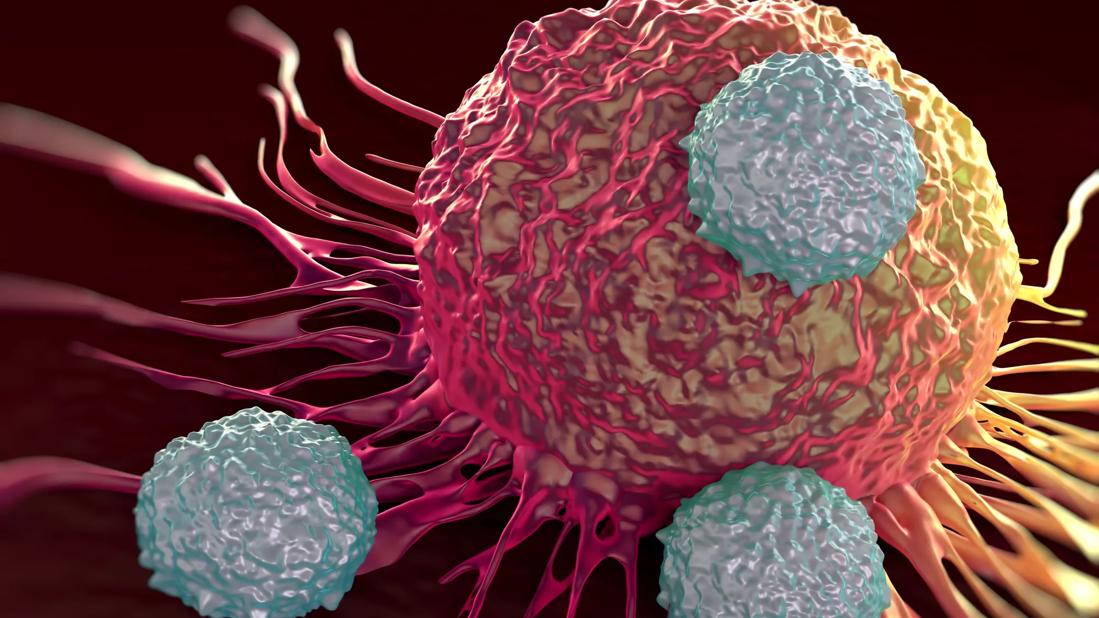
Researchers at Cleveland Clinic Martin Health are currently enrolling patients in a phase II open-label, multicenter randomized study of neoadjuvant and adjuvant treatment in patients with resectable, early stage (II to IIIA) non-small cell lung cancer (NSCLC).
Advertisement
Cleveland Clinic is a non-profit academic medical center. Advertising on our site helps support our mission. We do not endorse non-Cleveland Clinic products or services. Policy
Led by principal investigator Houssein Abdul Sater, MD, Regional Research Director of the Cleveland Clinic Florida Cancer Institute, the NeoCOAST-2 study is treating patients with early stage disease using novel immunotherapy combinations demonstrated effective in locally advanced disease.
“Immunotherapy helps the body build memory against cancer and can rev up the natural immune response,” says Dr. Sater, an immunotherapy clinical trialist and immune microenvironment expert formerly with the National Institutes of Health, where he established the Tumor Immune Microenvironment (TIME) Laboratory in Bethesda, Maryland. “It is the only treatment approach that offers the hope of a long lasting cancer cure.”
The NeoCOAST-2 study will assess the efficacy and safety of durvalumab, a human immunoglobulin monoclonal antibody, in combination with chemotherapy and oleclumab or monalizumab both before and after surgery.
“Durvalumab is a PDL1 checkpoint inhibitor that counteracts a tumor’s ability to evade the body’s immune response,” explains Dr. Sater. “It is the current standard of care for treating unresectable, stage III NSCLC.”
Recent research has demonstrated that oleclumab, an anti-CD73 monoclonal antibody, or monalizumab, an anti-NKG2A monoclonal antibody, in combination with durvalumab improved progression-free survival and objective response rate in locally advanced NSCLC compared to durvalumab alone.
“With NeoCOAST-2 we are hoping to achieve the same benefit for patients with early stage disease and show an improvement over standard therapy, which is surgery followed by chemotherapy,” says Dr. Sater.
Advertisement
Dr. Sater’s research team is currently enrolling patients for the NeoCOAST-2 study, which is being conducted across 49 trial sites around the world. “In May our team enrolled the first patient in the world in the trial,” he says, noting a total of 140 patients will participate in the two arms of the study.
The trial is meant for patients with early stage (II-IIIA) NSCLC that is resectable and doesn’t harbor certain alterations or mutations, such as epidermal growth factor receptor (EGFR) mutations and anaplastic large-cell lymphoma kinase (ALK) rearrangements. Patients must be newly diagnosed, previously untreated, and able to tolerate chemotherapy and lung surgery. Planned surgery to be performed must be either lobectomy, sleeve resection, or bilobectomy.
Following screening, eligible patients will receive a combination of chemotherapy and immunotherapy drugs prior to surgery followed by adjuvant treatment with immunotherapy drugs only for up to one year.
“Our primary endpoint is to see if patients receiving the neoadjuvant treatment prior to surgery have complete eradication of their cancer under the microscope,” says Dr. Sater. “We are also looking at the safety and tolerability of the investigational drugs.”
Since joining the Robert and Carol Weissman Cancer Center at Cleveland Clinic Martin Health in 2021, Dr. Sater has worked to assemble the research structure at Cleveland Clinic Tradition Hospital necessary to conduct clinical trials and offer Treasure Coast residents access to novel therapies.
Advertisement
“At the NIH my primary work was focused on salvage therapy, but I always believed that to eradicate cancer you need to hit it very early,” says Dr. Sater. “That’s why today my focus is on investigating cancer immunotherapies for early-stage disease.”
He points to the NeoCOAST-2 study as just one example of how the new research team at Cleveland Clinic Martin Health will collaborate with pharmaceutical companies and academic centers to bring promising drugs to the region.
Patients who might be interested in and are suitable for referral to the NeoCOAST-2 study may contact Angelic Gamez at gameza3@ccf.org or at 772.223.5945 ext. 10929 for more information.
Advertisement
Advertisement

The shifting role of cell therapy and steroids in the relapsed/refractory setting

Radiation therapy helped shrink hand nodules and improve functionality

Standard of care is linked to better outcomes, but disease recurrence and other risk factors often drive alternative approaches

Phase 1 study demonstrates immune response in three quarters of patients with triple-negative breast cancer

Multidisciplinary teams bring pathological and clinical expertise

Genetic variants exist irrespective of family history or other contributing factors

Study shows significantly reduced risk of mortality and disease complications in patients receiving GLP-1 agonists

Structured interventions enhance sleep, safety and caregiver resiliency in high-acuity units